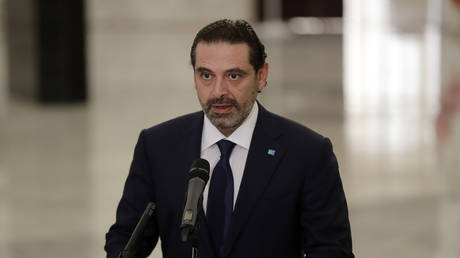
Former Lebanese PM Saad Hariri has been tasked with forming a new government, a year after his cabinet was toppled amid mass protests, and months after his successor’s government resigned after a deadly explosion in Beirut port.
Hariri on Thursday secured the backing of a majority of parliamentarians to return as prime minister after consultations with Lebanese President Michel Aoun. Earlier this month, the ex-PM had presented himself as the “natural candidate” to take control of the country.
In a brief statement following his designation, Hariri told the Lebanese people “who are suffering hardship to the point of despair” that he intends to “keep my promise, to work on stopping the collapse that threatens our economy, society and security.”
Hariri promised to form a government of non-partisan experts to implement economic and political reforms outlined in a initiative proposed by French President Emmanuel Macron during his visit in September, after the country which is going through a deep economic crisis was hit by a deadly explosion at Beirut port on August 4.
France, Lebanon’s former colonial power, has been trying to work with the country’s leaders to help pull the nation back from the brink of crisis. Back in September, Macron told a news conference that he was “ashamed of the Lebanese political leaders” for favoring “partisan and individual interests to the general detriment of the country.”
Mohamed Raad, head of Hezbollah’s parliamentary bloc, said the group “will contribute to maintain the positive climate” despite the fact that it didn’t nominate anyone for PM.
Georges Adwan from the Lebanese Forces Party, the second biggest Christian bloc in the parliament, which also did not nominate Hariri, spoke more cautiously: “Has this political class that took people hostage learned that they cannot continue in this way? It is now facing a test.”
Hariri has risen back to the top of politics in Lebanon almost a year after he resigned amid a wave of protests over corruption and inefficiency in government. His supporters at the time opposed his resignation over concerns that it would spark greater instability in the country and stall reforms.
The cabinet that initially succeeded Hariri’s was forced to resign after the devastating Beirut port explosion that killed more than 200 people, intensifying the protests. Prime Minister Hassan Diab and his government were accused of negligence and corruption.
Once in office, Hariri will face a combination of devastating political crises, including a banking crisis, plummeting currency, soaring poverty and crippling state debts. On top of that, the new government will have to deal with surging coronavirus cases and the ongoing fallout of the August tragedy.
To help address the issues on the table, Hariri’s government is expected to resume talks with the IMF for a bailout, although the international community earlier cautioned that it was hesitant to provide support before reforms are implemented.
France has proposed the type of cabinet that Hariri is reportedly considering, comprising non-partisan specialists who can focus on working on a roadmap to recovery.
Like this story? Share it with a friend!




